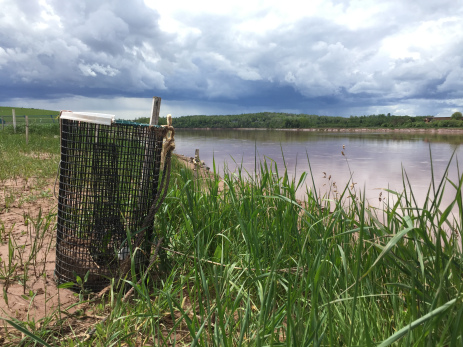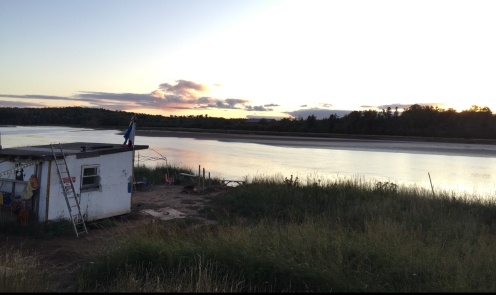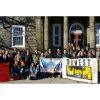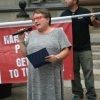KJIPUKTUK (Halifax) – “We are all Treaty people”. It’s a phrase we’re hearing more often these days. But what does it really mean, here in Mi’kma’ki? And what does it have to do with environmental justice?
Most settlers don’t think about the Treaties much. Even here in unceded Mi’kmaq territory, many of us imagine them as one-time transactions in the deep past. However, as we’ll hear in this episodes of Shades of Green, many Mi’kmaq rights holders understand the Peace and Friendship Treaties as sacred, living agreements. As Sipekne’katik District Warrior Chief Jim Maloney puts it: “I agree that we are a treaty people, and I have heard the Premier say that. His treaty is on paper. My treaty is on land. My tracks on my ground: that’s my signature, not on a piece of paper.”

In this episode of Shades of Green, we spend time with frontline Water Protectors resisting the Alton Gas project at the Truckhouse and Treaty Camp along the banks of the Sipekne’katik River. Alton Gas is proposing to dump massive quantities of mined salt waste into the river, which would pose serious risks to the river ecosystem along with the health, livelihoods and rights of Mi’kmaw communities. Water Protector and Treaty Scholar Michelle Paul sums up what has been bringing folks to the front lines: “There is no recipe for water. It is that simple. When water is gone that’s it. From water is life, and without water there is no life.”

This Mi’kmaw-led resistance has asserted the Peace and Friendship treaties in ways that are at once spiritual, political, and deeply practical. As Kukuwes Wowkis describes, “Last year when we built the Truckhouse seven of us from seven different districts threw our eel traps in the water. So right there, Alton Gas had to stop what they were doing with the brine because in our treaties, it’s our right to hunt and fish wherever we feel we can do that on Mi’kmaw territory.”

We hope you’ll tune into episode three of our Shades of Green podcast series, “Peace, Friendship and Environmental Justice.” Join us at the Treaty Camp to get a taste of what it’s like on the front lines of a movement that is so much bigger than stopping a single project. Let’s listen and reflect on what what stopping a natural gas storage project has to do with Indigenous self-determination, how the Peace and Friendship treaties might help us understand how to build just relationships with the land and each other, and what it means to be a treaty person.

Note: explicit language
Featured Voices:
Quotes have been condensed here for clarity and brevity. Huge thanks to every one of the ears and voices that made this episode possible, and particularly the Water Protectors holding down the Truckhouse and Treaty Camp against Alton Gas. You can support this Mi’kmaw-led resistance here.
Further thanks to Erica Butler and Peter Lane.
Our theme was composed by the incredible Nick Durado. We are also grateful to Jeremy Dutcher for his rendition of the Honour Song. Kepmite’tmnej, the Mi’kmaw Honour Song, was received in a sweatlodge by singer-songwriter George Paul in the 1980s.
This project has been supported by Ecology Action Centre and the Community Conservation Research Network
Subscribe on iTunes, SoundCloud, Stitcher, or Feedburner. And follow us on Twitter!
Further resources :
Stop Alton Gas: For our River, Air, Water and Climate
Elder Daniel Paul: Land of the Mi’kmaq
1752 Peace and Friendship Treaty
Miles Howe: Idle No More – Mi’kma’ki
Jacob Boon: Alton Gas approval called a “direct violation” of First Nations rights
Miles Howe: Going against the tide: The fight against Alton Gas
Sadie Beaton: Peace and Friendship on the Sipekne’katik River
Jerry Lockett: Saving the Shubenacadie
El Jones: We Can Stop Alton Gas
Sub Media: Mik’maq Resistance; Defend the Sacred
Protectors: Cross-Movement Resistance Against Alton Gas
Stories of the Shubenacadie: Podcasts
Elder Murdena Marshall: Mi’kmaq Seven Sacred Gifts of Life



